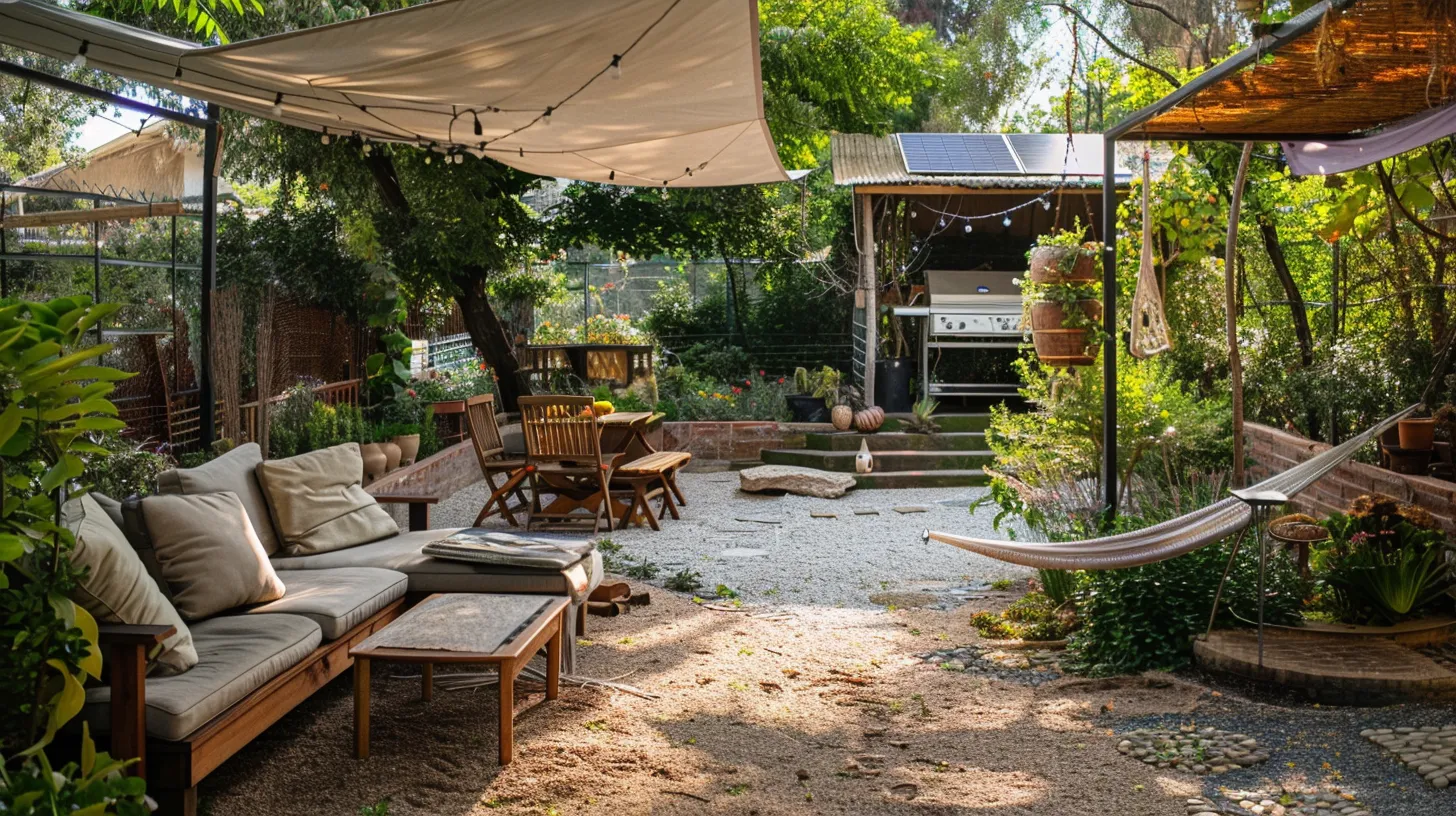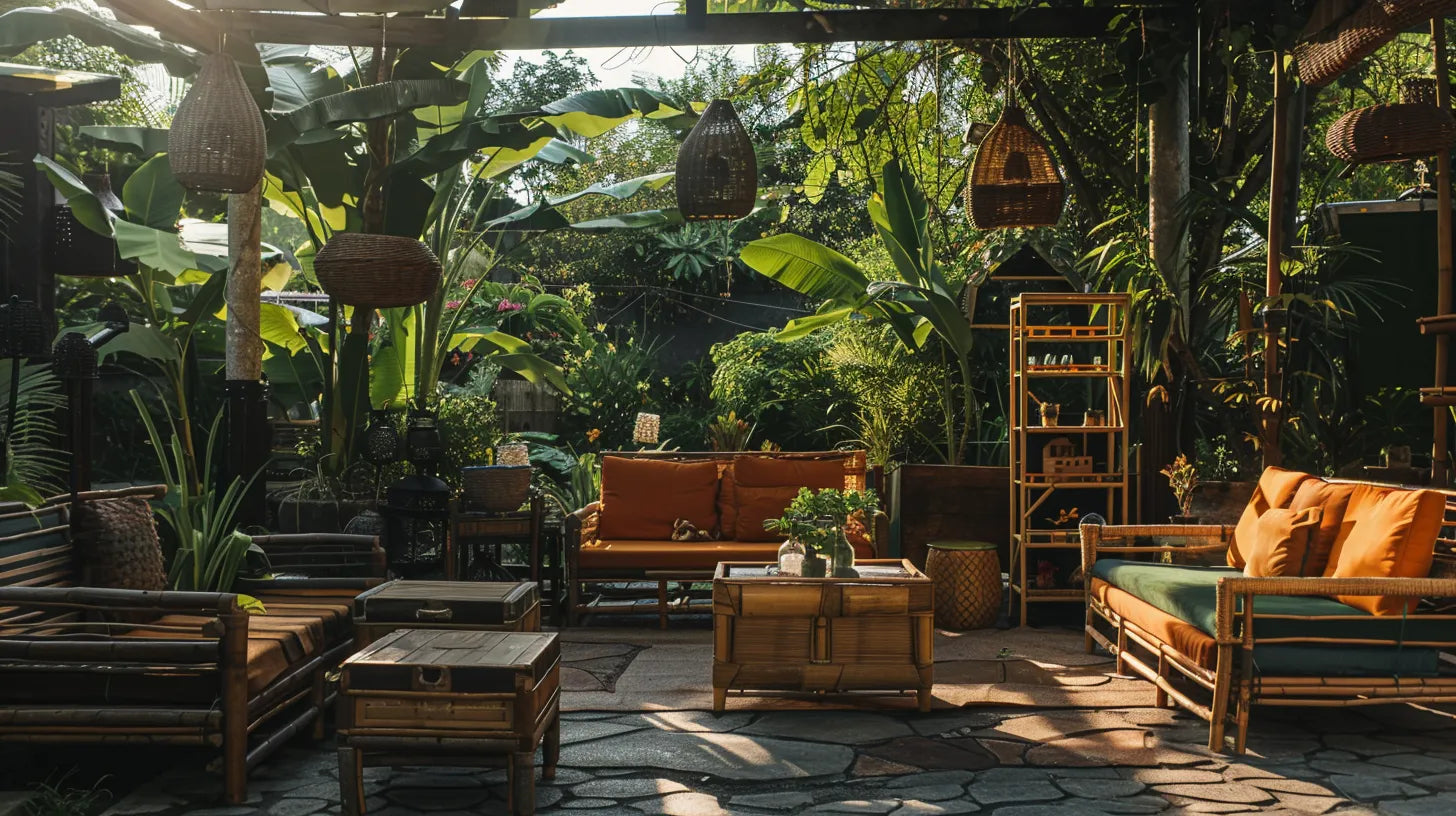Yes, there are eco-friendly and recyclable outdoor furniture cover options available. These options include materials such as organic cotton , recycled polyester, hemp, and bamboo. Some manufacturers also adopt a circular economy approach , producing covers that are completely decomposable. Recycled covers, made from post-consumer plastic waste , offer an environmentally friendly alternative that reduces demand for new plastic production. Even FSC-certified woods , such as teak, cedar, and cypress, which reduce impact on deforestation, can be used in sustainable wood cover options.
If you wish to discover more about these sustainable, durable, and aesthetically pleasing options, pursuing this inquiry further will certainly prove beneficial.
Understanding Eco-Friendly Materials

To fully appreciate the significance of eco-friendly outdoor furniture covers , understanding the sustainable and biodegradable materials used in their creation is crucial. These materials, such as organic cotton , recycled polyester , hemp, and bamboo, are at the core of the eco-friendly manufacturing process. By incorporating these materials in the production process, products are not only superior in durability but also beneficial for the environment.
These sustainable materials play a key role in the eco-friendly manufacturing process, which prioritizes water conservation , energy efficiency , and waste reduction . For instance, the cultivation of organic cotton requires much less water compared to conventional cotton. Similarly, the use of recycled polyester helps in reducing the consumption of new raw materials and energy.
Choosing outdoor furniture covers made from recycled materials or organic cotton contributes to a circular economy , where waste and resource input are minimized, and the life cycles of products are extended. This approach aids in reducing landfill waste, as these covers can decompose naturally at the end of their lifespan, unlike conventional covers that contribute to environmental pollution. Opting for eco-friendly covers not only helps in conserving our natural resources but also supports sustainable practices, promoting a greener lifestyle .
Benefits of Recycled Plastic Covers

Building on the theme of sustainability, another excellent eco-friendly choice for outdoor furniture protection is the use of recycled plastic covers . These covers are made from post-consumer plastic waste , reducing their environmental impact to a great extent. This process not only aids in waste management but also lessens the demand for new plastic production, curtailing the release of harmful emissions.
The design and functionality of these recycled plastic covers are equally impressive. They ingeniously replicate real wood, providing a stylish alternative that enhances the aesthetic appeal of your outdoor space. Despite being lightweight, these covers are robust and durable, ensuring your furniture is well-protected from elements like sun, rain, and snow.
The convenience offered by these recycled plastic covers is another notable benefit. They can be easily handled, moved around, and stacked when not in use, saving valuable space. Whether you have a compact balcony or a sprawling backyard, these covers can be efficiently stored, keeping your surroundings tidy.
Exploring Sustainable Wood Options

In the world of sustainable outdoor furniture covers , wood sourced responsibly from FSC-certified forests , such as teak, cedar, or cypress, presents an eco-friendly and aesthetically pleasing alternative. These timber types, renowned for their durability and natural aesthetic, provide a high-quality solution for outdoor furniture covers, while also contributing to the preservation of our planet .
The FSC-certified label guarantees these woods are harvested from responsibly managed forests, reducing the impact on deforestation and supporting sustainable forestry practices. Moreover, by choosing sustainable wood options, consumers are directly contributing to the protection of our ecosystems.
Recycled wood and reclaimed wood are also remarkable options. Not only do they prevent unnecessary logging, but they also add an extra layer of character, each piece showcasing a unique history . These options, combined with the use of eco-friendly sealants, further enhance the environmental benefits .
Whether you're looking for a cover for your patio set, bench, or barbecue, opting for sustainable wood outdoor furniture covers is a decision that marries style with environmental consciousness. While providing a natural aesthetic, these covers also confirm a commitment to preserving our world for future generations.
Advantages of Organic Cotton Covers
While sustainable wood offers a vital and natural option for outdoor furniture covers, organic cotton covers present a plethora of environmental and practical benefits worth considering. Organic cotton, a sustainable and environmentally friendly material, is utilized for these covers, greatly reducing the use of synthetic materials in outdoor furniture protection.
Their inherent nature as natural, biodegradable fibers free from harmful chemicals makes organic cotton an eco-friendly solution for outdoor furniture covers. This choice of material not only promotes sustainability but also supports ethical farming practices, contributing to a healthier environment overall.
Furthermore, organic cotton covers offer practical benefits for the user. One such advantage is their breathability , which allows air to easily circulate. This feature is essential in preventing mold and mildew growth, common issues with outdoor furniture. Additionally, organic cotton covers are easy to clean and maintain, proving to be a durable solution for the protection of outdoor furniture.
The Rise of Recycled Polyester Covers
Shifting our focus from organic cotton, another innovative and sustainable solution gaining popularity in the domain of outdoor furniture covers is the utilization of recycled polyester . These recycled polyester covers are made from post-consumer plastic bottles, transformed into a durable fabric that offers a sustainable alternative to conventional synthetic covers.
The usage of such eco-friendly materials helps to notably reduce plastic waste and also lessens the overall environmental impact. Additionally, these covers exhibit exceptional characteristics, being UV resistant and water repellent , which make them highly suitable for outdoor use.
Furthermore, the easy-to-clean nature of recycled polyester covers, coupled with their availability in a myriad of colors, styles, and sizes, offers a wide range of options for different outdoor furniture pieces.
Eco-Friendly Manufacturing Processes
Eco-friendly manufacturing processes for outdoor furniture covers are gaining momentum, focusing on water conservation , energy efficiency , and waste reduction to mitigate environmental impact. These sustainable practices have emerged as a response to the demand for more sustainable outdoor furniture products , and they incorporate the use of biodegradable materials to limit environmental harm.
Notably, the production of eco-friendly outdoor furniture covers often involves the use of organic cotton, recycled polyester, hemp, and bamboo. These materials are not just sustainable but also biodegradable, thereby reducing waste and pushing towards a more circular economy .
Moreover, manufacturers in this sector are increasingly prioritizing processes that reduce waste and enhance energy efficiency. The commitment to these practices reflects a broader shift towards sustainability in the outdoor furniture industry. By opting for outdoor furniture covers made from organic cotton or recycled polyester, consumers can actively contribute to this shift, supporting not only the environment but also manufacturers who are taking steps to reduce their ecological footprint.
In essence, the rise of eco-friendly manufacturing processes for outdoor furniture covers illustrates the power of consumer demand in driving industry-wide change towards sustainability.
The Role of Water and Energy Conservation
In the domain of sustainable practices , the role of water and energy conservation in the production of eco-friendly outdoor furniture covers is both significant and transformative. The adoption of eco-friendly materials such as organic cotton and hemp not only supports water conservation but also encourages the use of natural resources that require less water-intensive cultivation methods.
Moreover, sustainable manufacturing processes prioritize energy efficiency, reducing environmental impact . This is particularly evident in the creation of covers made from recycled polyester and bamboo, materials that require less energy in production compared to traditional plastic-based alternatives. These recycled materials contribute to sustainable practices by minimizing waste and mitigating the environmental footprint of the industry.
The focus on water and energy conservation in producing eco-friendly covers aligns with the growing consumer preference towards eco-conscious products. This not only aids in the preservation of natural resources but also supports the broader mission of sustainable development . By promoting water and energy conservation, the production of eco-friendly outdoor furniture covers becomes a transformative force in the industry, setting a precedent for other sectors to follow suit in prioritizing sustainability.
Aesthetic and Health Benefits of Eco-Friendly Covers
Beyond their critical role in environmental sustainability, eco-friendly outdoor furniture covers also offer significant aesthetic and health advantages. Made from recyclable materials such as organic cotton, recycled polyester, hemp, and bamboo, these covers not only protect your furniture but also contribute to a healthier planet .
Eco-friendly outdoor furniture covers are designed with aesthetics in mind . They come in a variety of colors and patterns, enabling homeowners to match their outdoor decor seamlessly. As these covers extend the lifespan of your furniture, they keep it looking new, reducing maintenance costs and contributing to a visually pleasing outdoor space.
In terms of health benefits , covers made from organic cotton or hemp are non-toxic and hypoallergenic , reducing the risk of skin irritation or allergies. Additionally, bamboo is known for its antimicrobial properties , offering an extra layer of protection for your health.
Sustainable manufacturing processes for these covers prioritize water conservation, energy efficiency, and waste reduction. By choosing eco-friendly covers, consumers support these sustainable practices, further reducing their environmental footprint. The benefits of eco-friendly outdoor furniture covers extend beyond aesthetics and health, promoting sustainability, and contributing to environmental protection.










